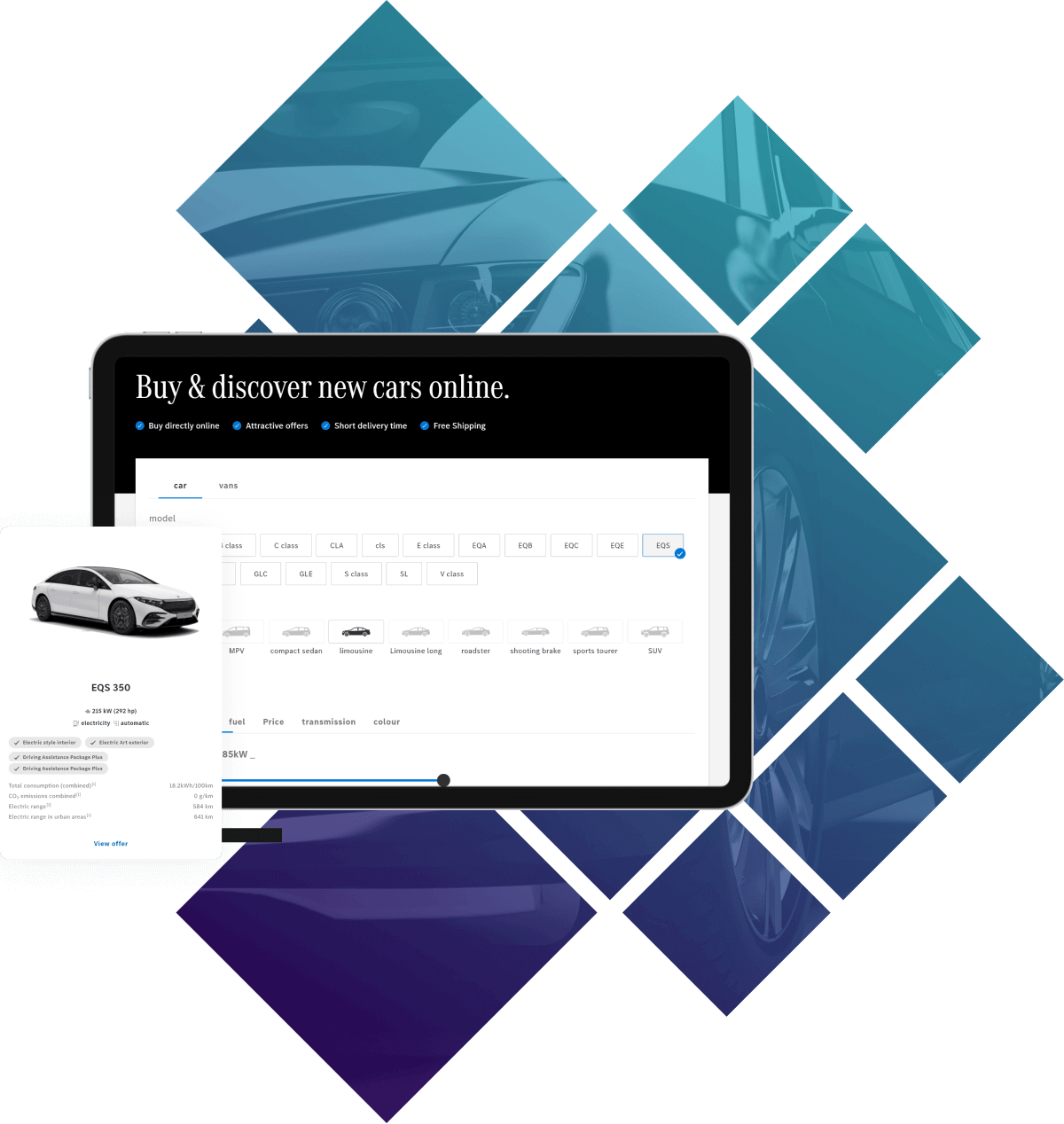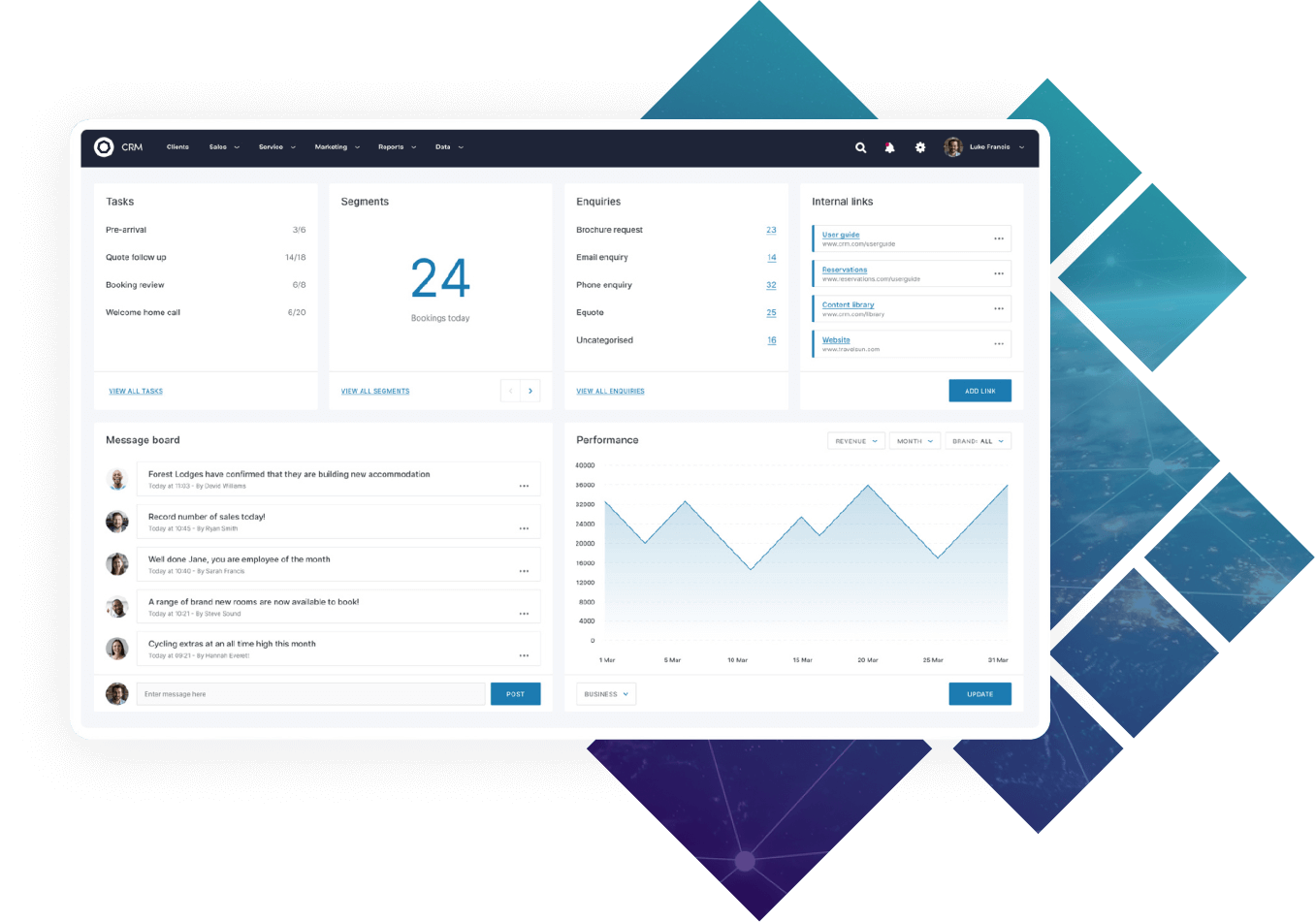The world is changing at an unprecedented pace, due in no small part to rapid technological advances. As a tech company, how can you keep pace and gain the approbation of your audience? Innovation requires talent, and good talent is scarce. You can try to get the most out of your in-house team, but they have their performance limits, so you face the need to scale and upgrade your business with more people. Where to find the right talent? Some fill in the blanks through their own hiring, while others resort to a dedicated development team model and enjoy the game.
What is it? What are the benefits of hiring a dedicated development team? When will this model be your perfect option? To answer these and a bunch of other burning questions, we’ve compiled a first-hand guide to train you in the craft of team outsourcing.
What is a Dedicated Development Team?
You Can’t Break the Wheel of Progress
Despite turbulences observed throughout the world and the propagation of artificial intelligence that may transform the industry from top to bottom, we may expect an annual growth rate (CAGR 2024-2029) of 8.48% for revenues in IT outsourcing, with the market volume figure hitting US$800bn and beyond by 2029. Most revenue is expected to be from the United States. The final figure and projected outcome are subject to change, as the Russia-Ukraine war is still ongoing, exercising market impacts.
That said, technology won’t stop its evolution, and the world will surely witness the demand for specialized talent such as AI engineers or enterprise software developers. That’s when a dedicated development team enters the stage for many, as expanding and staying relevant can become quite challenging when you do it all by yourself.

“Thinking about expanding your business solution and need expertise? We are here to help.”
What’s in the Name?
The word “dedicated” in “dedicated development team” implies that a service provider allocates a team of developers to work exclusively for you, i.e., they are dedicated to your project. This collaboration model ensures that team members are fully committed and focused on delivering quality solutions within the specified timeline.
You might have heard about shared teams who take on tasks for multiple clients. Dedicated teams will not do such thing, so in the end you get their full attention and continuity in the project. If need be, clients may access each individual developer, while the service provider navigates all the intricacies of the recruitment process and employee retention, securing office space, IT infrastructure, HR support, and employee benefits.

Who’s There?
If you compare a dedicated development team model to an in-house team, you’ll notice the similarity between the roles within the two, with the possibility to supplement some positions with in-house staff. Yet, the composition of a dedicated team boasts a higher level of flexibility and can be adjusted to the specific goals of a project. Our years of custom development prove that such teams typically include a mix of developers, UI/UX designers, QA engineers, project managers, and other industry experts.
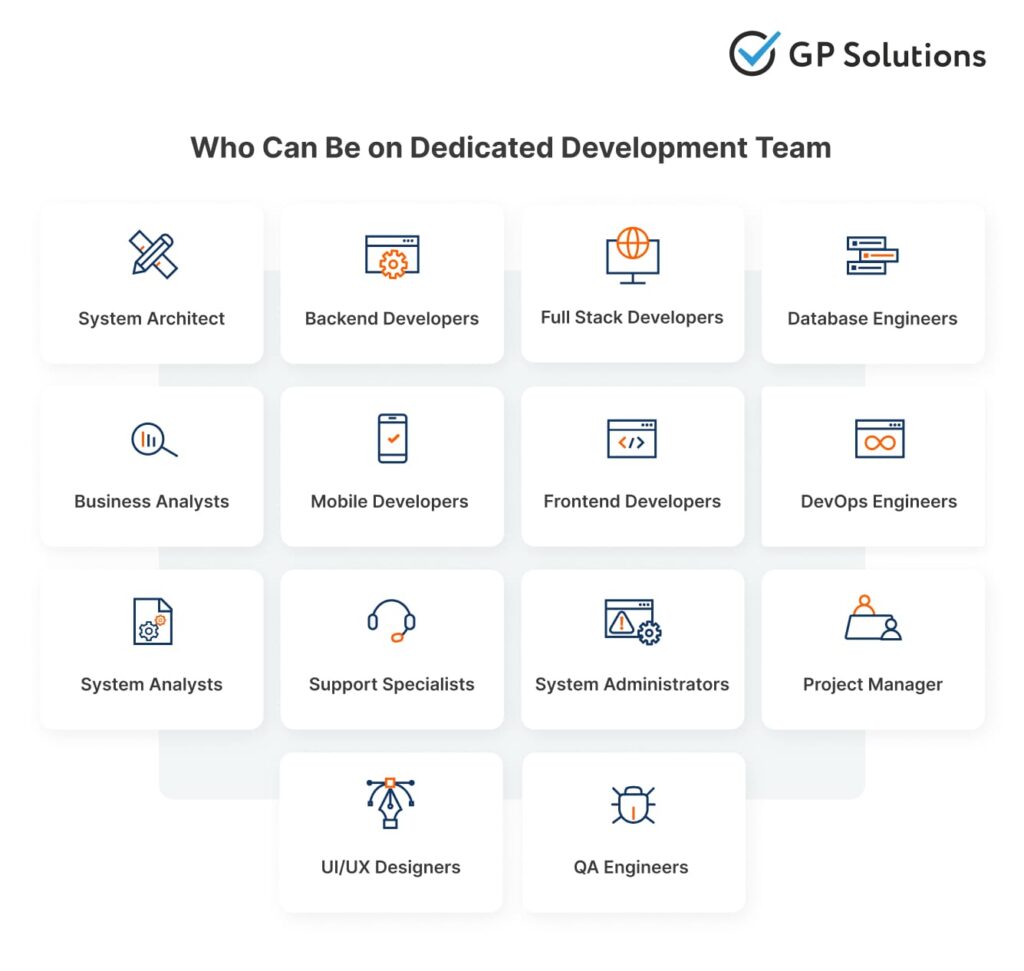
In-House vs. Dedicated Development Team
When deciding between the two, we need to get a clear notion of the key differences in their structure and features. A dedicated development team (DDT) consists of professionals who focus exclusively on your software project and are usually provided by an external vendor, while an in-house team operates directly under your organization.
We believe the table below will be of assistance to you when determining your best fit.
| DDT | In-House | |
|---|---|---|
| Location | Remote office, often offshore/nearshore | Your local office or remote work from any part of the world depending on your hiring policies |
| Cost | More cost-effective due to lower development costs in some regions and no infrastructure cost | Higher costs due to salaries, benefits, and overhead |
| Team Control | The client runs remotely, indirect management through the service provider | Direct, immediate access to the team |
| Culture | Potential issues associated with cross-cultural cooperation | Greater possibility to build a unique corporate culture |
| Commitment | Focus on your project only | Can work on multiple internal projects |
| Flexibility | Easily scalable based on project needs | More rigid structure, scaling requires hiring or firing |
| Recruitment | Handled by the service provider | Managed internally, time-consuming and resource-intensive |
| Expertise | Access to a wide range of specialized skills, exactly what your project needs | Limited by current staff’s expertise, might be insufficient |
| Integration | Can work closely with in-house teams | Fully integrated within the company culture |
| Employee Retention | Managed by the service provider | Requires internal strategies and resources |
| Infrastructure | Managed by the service provider | Requires investment in office space and IT infrastructure |
When Do You Need a DDT? Typical Scenarios
In general, dedicated software development teams are best chosen for complex and large-scale projects rich in technologies and expertise fields. Due to the nature of this cooperation model and its specialized expertise, such teams can handle intricate and unexpectedly evolving environments. With short-term projects, you can sometimes do with a team of freelancers, while a comprehensive, long-term project relies on consistency and stability.
Here are some scenarios where DDTs are particularly effective:
- Your specialized assets are limited.
When companies lack specialized talent, such as QA or travel tech, dedicated teams can fill these gaps. They link enterprises to a global talent pool and connect to experts with skills for deep-expertise projects.
- You seek long-term collaboration.
For projects with extended timelines, a dedicated team ensures continuous engagement, providing the commitment and understanding needed for sustained progress. The ongoing involvement as a pillar of this model helps navigate constantly shifting landscapes and occurring complexities. All this united makes DDTs indispensable for initiatives projected to last months or years.
- You want to launch an MVP (Minimum Viable Product).
By resorting to a dedicated development team for MVP development, you can strike the perfect balance between cost considerations and an operating product within a reasonable time frame. This risk-free approach empowers you to get all you need to move your product further in the investment chain.
- Your project is complex and large.
A rock-solid team can see deeply into your project’s mission and ensure effortless collaboration over time. Their dedicated focus on a single project guarantees consistent progress and quick updates throughout your software’s cycle.
- You are a rapidly growing startup.
Startups and new products often face the challenges of shifting market dynamics. Dedicated development teams offer the flexibility much needed to scale quickly and to keep up with such changes. A team of devoted experts facilitates long-term customer relationships for startups and promotes innovation through fresh ideas.
- You have several ongoing projects.
Juggling multiple projects can put marginal pressure on your resources. Hiring a dedicated team lets you achieve efficient workload management and faster project completion without quality compromises. This is especially relevant if your in-house team is at capacity but needs to proceed to new software projects.
- You need to scale now.
When the workload builds up, dedicated teams offer the scalability you crave to rapidly expand development capacity. This flexibility plays most operational for startups and established companies who face dynamic requirements.
- You are in need of specialized know-how.
Projects requiring rare expertise, such as deep learning, benefit from dedicated teams most vividly. Such teams provide access to specialists worldwide, ensuring that projects are staffed with the right talent.
- You need to make it faster to the market.
Dedicated teams help accelerate time-to-market by quickly assembling a skilled development team. This allows core teams to focus on strategic initiatives rather than day-to-day development tasks, enhancing overall innovation and competitiveness.
What Are the Benefits of a Dedicated Development Team?
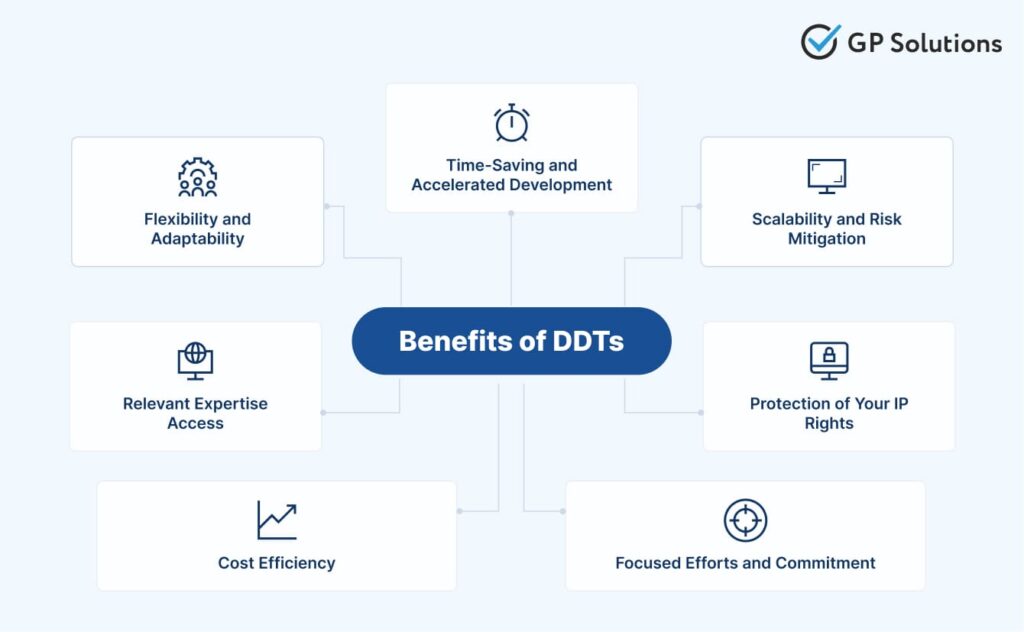
Cost Efficiency
A dedicated development team model is most often associated with considerable cost savings. Or why else would this approach make so many waves, right? With DDTs, you pay only for the hours worked, getting short shrift to social benefits or replacing outdated office equipment. It should not come as a surprise that in the long term this approach will prove to be more affordable compared to in-house hiring, as you forget the pains (and costs!) of recruitment, onboarding, administration, and employee benefits. It is also smarter than taking on multiple short-term contracts, even with the initial investment to build the team.
It is always a good idea to consider cost-effective regions like Central and Eastern Europe if you want to cut costs even further. You can check the cost spread in the table below.
Rates Comparison
| Role | Hourly rate, North America | Hourly rate, Latin America | Hourly rate, Central & Eastern Europe |
|---|---|---|---|
| Project manager | $85–$123 | $62–$77 | $59–$78 |
| Business analyst | $70–$154 | $57–$69 | $55–$83 |
| Software architect | $110–$182 | $80–$92 | $75–$100 |
| UX/UI designer | $85–$100 | $49–$66 | $59–$75 |
| Senior developer | $100–$125 | $65–$74 | $64–$80 |
| Middle developer | $80–$144 | $50–$64 | $53–$70 |
| Junior developer | $65–$91 | $38–$52 | $37–$50 |
| Automated QA | $167–$174 | $61–$72 | $63–$74 |
| Manual QA | $100–$162 | $54–$65 | $61–$71 |
| DevOps | $100–$164 | $62–$80 | $74–$80 |
Source: Accelerance.
Relevant Expertise Access
DDTs unlock access to specialized developers swimming in a global talent pool. Consider the example of Central Europe which is widely recognized as a tech hub nourishing talented software developers for healthcare, banking, and fintech. A dedicated development team from this region will equip you with the expertise you lack, eliminating the need to spend time and resources on upskilling your in-house team. It also allows you to get around the rules of the local hiring market and hand-pick experts based on your unique criteria.
Flexibility and Adaptability
After hiring a dedicated development team, one of the most prominent benefits you’ll certainly enjoy is the possibility to adjust its structure and size. This DDT’s feature enables you to modify who is on the team currently, add or remove its members, define the scope of tasks, or align the timeline to your business objectives and market conditions. If your development provider is a pro, you can simply ask for changes to the team with no need to invest in recruitment. We can compare a DDT to a Lego toy that you can adapt and rebuild as your time frame and budget require.
Time-Saving and Accelerated Development
Business is a race, so if you want to jumpstart your quality product faster than your competitors do, you’ll have all the chances to leave them all on the roadside. DDTs are perfect at ensuring a speed advantage, as you will be able to secure talent within days thanks to the access to a pool of ready-to-go developers. They will focus efforts on your mission and seamlessly integrate into your in-house unit to drastically shorten the time-to-market for new features and products.
Scalability and Risk Mitigation
With the dedicated team model, you’ll be capable of overcoming scaling challenges way faster than with in-house hiring. Cooperating with a dedicated software vendor allows you to quickly add professionals whenever your project requires extra hands, be it web developers, mobile developers, or an old-school Java developer to revamp your legacy system. The competition for tech talent may burgeon you as never before, so this approach enables you to play safely and meet timeline requirements. Apart from that, you can minimize risks associated with local hiring and draw the right expertise from international talent.
Protection of Your IP Rights
The code created while collaborating with a dedicated development team will belong solely to the client, as is the case when the job is done by an in-house team. You may rest assured that all the instances of intellectual rights will remain in your property and be protected by a legal agreement signed between you and the service provider.
Focused Efforts and Commitment
As we’ve stressed several times, dedicated members will be solely focused on your solution. Each of them is carefully selected in compliance with the project’s need to fill skills gaps. This creates a perfect ground for your core team to drive their focus towards more essential business processes and strategic initiatives, with your organization’s overall success as the ultimate goal.
Checklist before Building High-Performing Dedicated Teams
We’ve designed a checklist with questions you’d better go through before signing a contract with a vendor of your DDT.
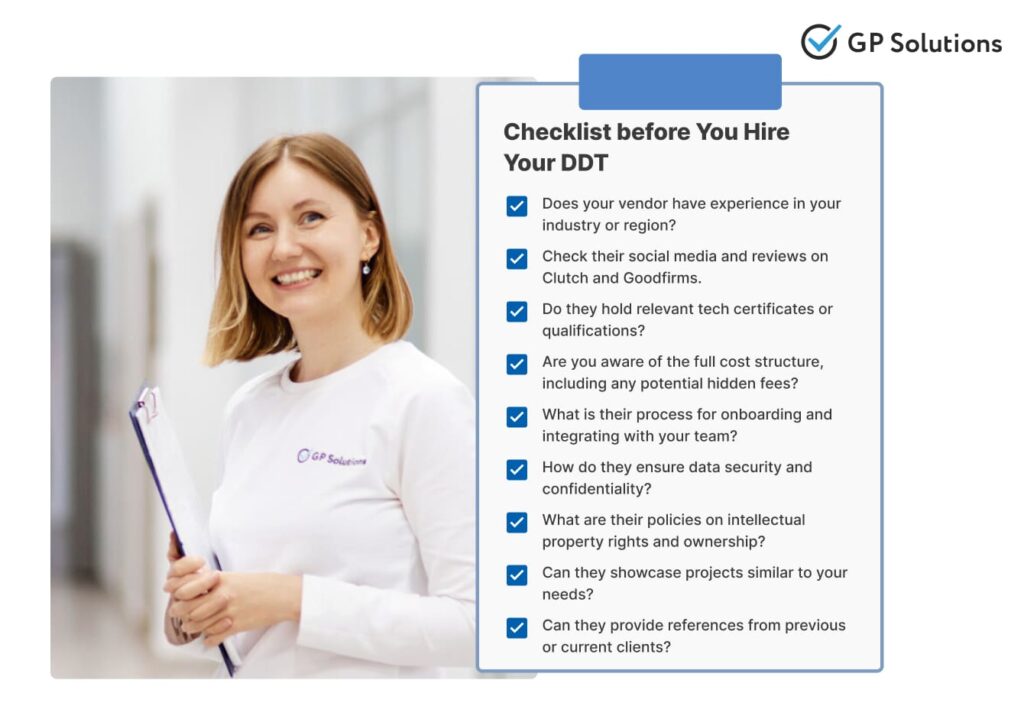
How to Build a Dedicated Development Team?
The process of compiling a dedicated software team involves two main players: the Customer and the Provider. It would be a wise practice to clearly define their responsibilities and avoid any confusion later. Their scopes of responsibilities are typically divided as follows:
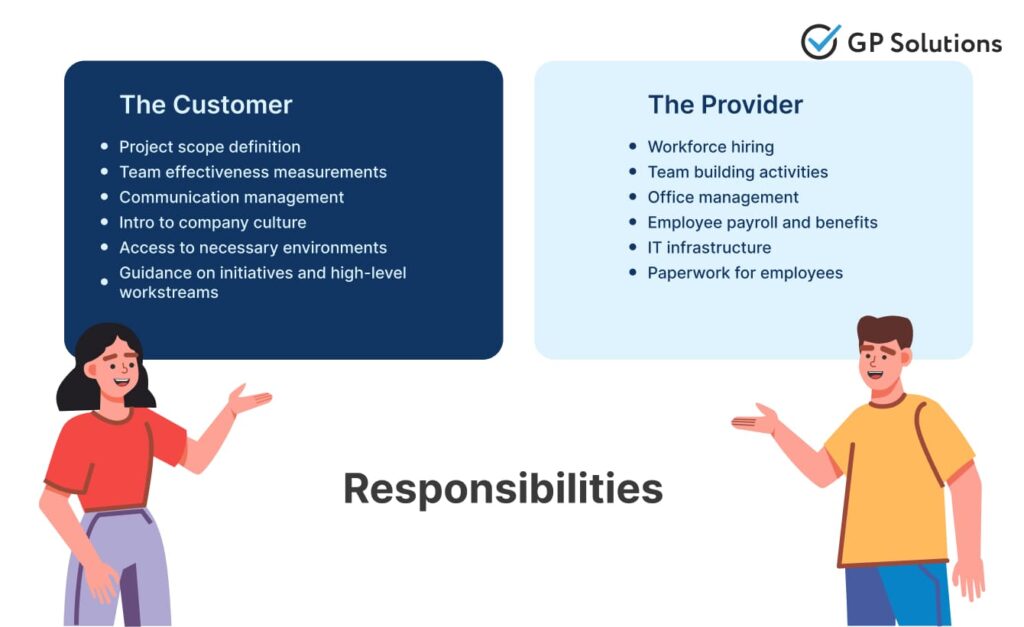
Now that we’ve set out the responsibilities of each party, the next question would be how to proceed?
Define Your Project Requirements
Before bothering your vendor, make sure you have a clear vision of the tech stack you’ll need and features you want to implement. This will help your partner align the team with your needs. Provide company information to hire developers who fit your culture. The clearer your project vision, the smaller the chances of misaligned expectations and deliverables.
Interview Candidates
The hiring process involves multiple interview rounds. First off, the vendor takes care of technical and HR interviews and forwards successful candidates to you. Assess the vendor’s company culture, communication, and ability to meet requirements. At GP Solutions, we actively screen CVs, interview candidates, and present detailed profiles of those who qualify. If none fit, we repeat the process until we find the right match.
Establish Communication and Collaboration Tools
Choose collaboration tools and formats that promote seamless teamwork with your dedicated development team, regardless of their location. With us, you can always rely on the time-tested Agile and Scrum methodologies that emphasize flexibility, collaboration, and customer satisfaction.
Onboard Your Team
The degree of your involvement in setting up processes and regular communication will affect the time-efficient kick-off of your project. Once everything has been setup and all the agreements are signed, the dedicated development team joins in within a day or two, scrutinizing your specifics and integrating with your in-house setup. Treat onboarding seriously and it will pay off shortly.
Set Up Governance and Reporting Structures
Oversight maintenance and project success management require metrics and KPIs that should be agreed upon with the vendor. Make sure you get regular updates and real-time insights into progress. Consistency will help both sides assess milestones and adjust the process accordingly.
Ensure Continuous Improvement and Adjustment
See through that you have a framework for ongoing feedback and improvement in place. This approach allows your project to run like a well-oiled machine and scale as needed. The vendor’s agile methodology and talent pool are key factors in quick adaptation to project changes or challenges.
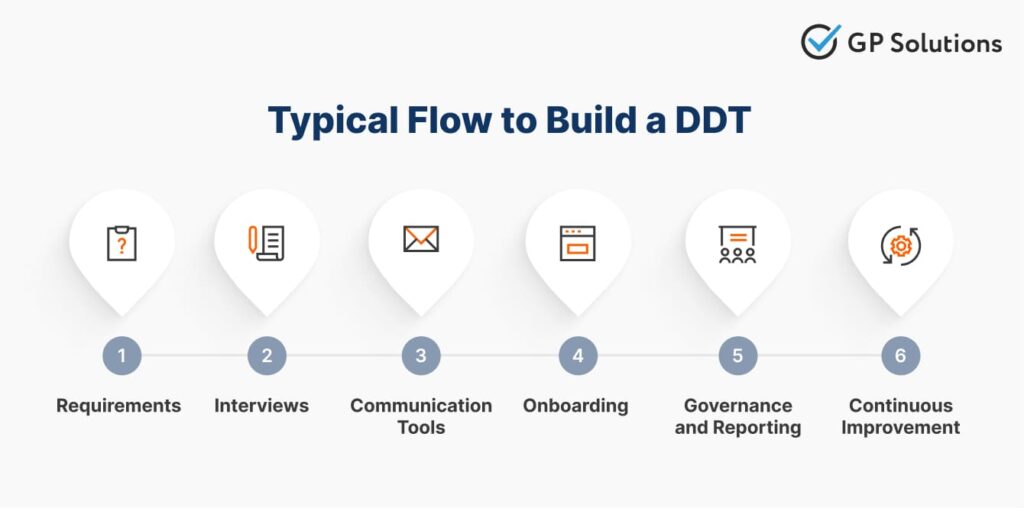
How Much Is the Cost?
Naturally, we cannot place a price tag without knowing exactly what kinds of qualifications you want to see on the team. Yet, you may approach your selection process as a strategy pro and find an ideal team for your budget and project needs, if you study the factors that impact costs:
- Developers’ location: Rates vary by region. Developers in areas with higher living costs typically charge more.
- Team size: Larger teams will cost you more, but they have positive influence on communication and efficiency in complex projects. Smaller teams cost less, but may not be trained in specific expertise you require.
- Expertise level: Senior specialists with domain experience can greatly contribute to project success, but most likely cost more.
- Scope and duration of the project: Longer projects may come with discounts or fixed-cost options.
- Additional services: Services beyond core development, like project management and ongoing support, can also affect overall costs.
On a Final Note
Hiring a dedicated development team comes with world-class talent, cost efficiency, and flexibility. Many companies prefer this option over in-house teams due to high local developer costs. The key lies in choosing the right tools and processes.With GP Solutions, you can have a fully dedicated development team up and running with little to none efforts. If our article convinces you that this is the right solution, let us manage your software development while you focus on growing your business.















